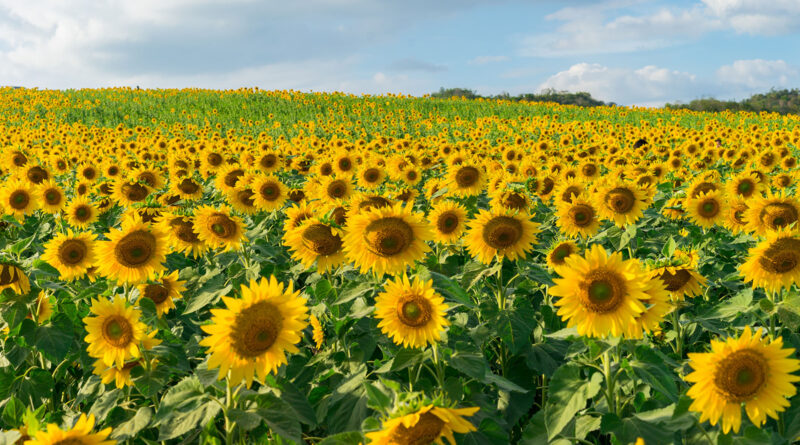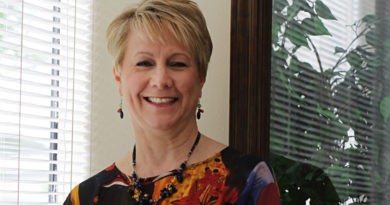Of Sprawl and Sunflowers
By JANNA ZEPP
When I worked at the III Corps Public Affairs Office on Fort Hood (now Fort Cavazos), there were some evenings during my drive home from post when I rolled down the windows in my car just to smell the sunflowers in the heat of a late summer afternoon. The farmland around here used to be full of those bright yellow and black/brown flowers in summer. To me, they represent summertime in Texas and this is where I start to ramble, so y’all bear with me. Sunflowers make me get all sentimental about my dad. I smell ’em and I am reminded of walks with my father in a pasture during summers spent in Greenville up in Northeast Texas. On these walks, my father would expound at length about all things liberal arts or natural sciences.
I think I got more education walking through those pastures with Daddy half a century ago than I did on my January terms at Austin College nearly 40 years ago. I learned about cottonmouth and copperhead snakes, trust, cows and calving, common sense finance, character versus reputation, skunk risk assessment, dairy bull psychology, personal integrity, the hygiene habits of hogs (they’re not what you think), good dogs and bad neighbors, milkweed, the combined physics of firecrackers and cow patties, tractors, mules, ticks, Johnson grass, possum forensic science, Uncle Doc, forgiveness, God and feed store politics.
On my drives home now, I don’t see as many empty pastures and sunflowers, but I do see a lot of construction sites.
I have mixed feelings about that.
On the one hand, I am a fan of convenience and access to amenities a thriving metropolis offers. On the other hand, I miss country life.
Recently, I was driving through a Temple neighborhood I once lived in and noticed that the cow pasture across from the middle school was no longer there. It had become a sand lot full of construction vehicles and equipment. Yet another subdivision is being built where a heard of beef cattle used to graze.
Made my heart sink a little, and reminded me that nothing ever stays the same.
Even my own Salado is booming with new residential subdivisions springing up where farmsteads once were. The rate at which these are being built alarms me.
I think back to when my parents came to visit me during my gap year in Germany in 1985. Dad and I were standing on the banks of the Rhine River not far from the Dom zu Speyer (Speyer Cathedral), one of the three oldest remaining cathedrals in Europe. He looked at that thousand-year-old church and said, “I sometimes wonder if it’s wise to leave old buildings standing. That kind of history does not lend itself to encouraging social and educational progress. Of course, if we fail to remember history, we’re doomed to repeat it, I suppose. We ought to remember, but we also ought to forget.”
I thought my father was insane. Who, in their right mind, would want to destroy that beautiful, ancient architecture to make way for some of the ugly, nondescript, sterile, box-style buildings that were popular over there at the time?
Later, in my Heritage of Western Civilization Class at Austin College, we discussed the Reformation of the Church during the European Renaissance and I saw my father’s point. As deeply Christian and conservative as he was, he also keenly understood the importance of non-theocratic and non-monarchical governments. Those old churches and palaces of the past still held sway, in his mind, over the ability of a country’s citizens to think for themselves.
I suppose the same could be said about our own growth and development in Texas. I remember when our family still relied on farming and ranching for economic survival. My father, the eldest son in his family, grew up helping his father raise cotton, cattle and corn. But his father was the only one in his own family who did not get to go to college. He strongly encouraged my father — all of his children, actually — to pursue college degrees.
“Get a job that lets you work indoors in air conditioning,” my grandfather said. “You’ll live longer.”
My father always had a soft spot in his heart for farmers and ranchers. He also saw that many independently owned farms and ranches would soon give way to commercial agricultural conglomerates. He watched it go that way in his youth during the middle of the 20th Century, and I remember dinner table conversations in the 1970s and 1980s about it while I still lived at home. It broke his heart. Dad was a professional educator by career, but a cowboy and a farmer in his soul.
“Everything must evolve, but we’re losing something vital when we lose independent farmers and ranchers,” he said.
On road trips with my father, he’d remark about how pastures were turning into neighborhoods and commercial shopping centers. He mourned the fertile black land being turned for the last time to lay concrete foundations.
“Nothing stays the same,” he’d say. “I just wish it wouldn’t go quite so fast.”
I am a part of the last generation of my family that remembers when we farmed to make a living. I remember the smell of freshly harvested cotton, of sweet feed for cattle, and of the Blackland Prairie after a rainstorm. I’ll save you the description of animal husbandry, though. It’s not idyllic and it might give you nightmares, but I remember how hard my father laughed at me when I walked up on the remnants of bovine afterbirth in one of our pastures and thought we’d come up on a crime scene.
Even that old farm up in Greenville is gone now to make way for a housing development, and with it, all the sunflowers. To quote a popular farm truck bumper sticker from the 1970s, “Crime doesn’t pay. Neither does farming.”
I know that the times change. I’ve lived long enough to know that intimately. They have to change for us to move forward. I delight in seeing Bell County bloom and grow with new businesses and new people. It’s too good here not to share. Still, I hope we always make space for what once was: for the independent farmers and ranchers, for the small towns that stay small, and for the pastures full of sunflowers each summer.
And then, as I wrote this feature, Salado neighbor Nicole Bolen posted this message in our Salado People group on Facebook: “Someone’s very confused cow is wandering around on 1670 right above West Amity.”
Bolen’s post sparked a friendly, funny, and purely farmer conversation in the comments.
Jeramey Young responded: “Mark Joel, is this one of your field puppies?”
Stacy McLoud answered: “Jeramey Young, it was ours. We got her put up.”
Samantha Maietta commented: “I always miss the cows. Woke up to sheep and horses in my yard on (two) separate mornings — I need cows to complete the trifecta.”
Stacy McLoud came back with: “Samantha Maietta she doesn’t mind very well, otherwise I would bring her over.”
Salado — and consequently, Bell County — might be booming in population, but the sunflowers are blooming too. We’re not growing too fast.
Not yet. Not as long as somebody’s cow is showing up in a neighbor’s yard and I still see, while driving through downtown Temple, cowboys in their dually pickup trucks towing horse trailers with their saddled mounts in them after a long day of work. We are still who we’ve been since the beginning, even though we’re adapting for what’s to come. For now, and likely for a long time to come, the sunflowers will remain.




